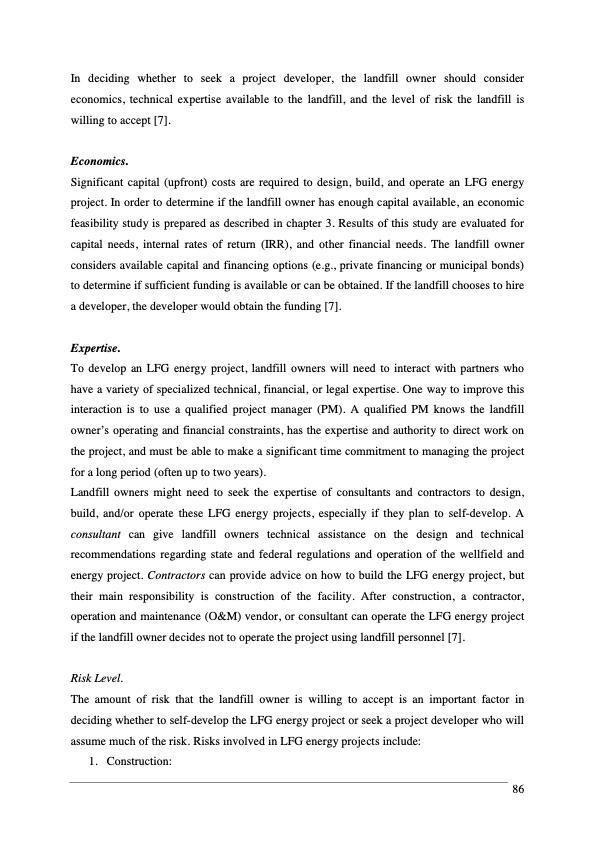
PDF Publication Title:
Text from PDF Page: 086
In deciding whether to seek a project developer, the landfill owner should consider economics, technical expertise available to the landfill, and the level of risk the landfill is willing to accept [7]. Economics. Significant capital (upfront) costs are required to design, build, and operate an LFG energy project. In order to determine if the landfill owner has enough capital available, an economic feasibility study is prepared as described in chapter 3. Results of this study are evaluated for capital needs, internal rates of return (IRR), and other financial needs. The landfill owner considers available capital and financing options (e.g., private financing or municipal bonds) to determine if sufficient funding is available or can be obtained. If the landfill chooses to hire a developer, the developer would obtain the funding [7]. Expertise. To develop an LFG energy project, landfill owners will need to interact with partners who have a variety of specialized technical, financial, or legal expertise. One way to improve this interaction is to use a qualified project manager (PM). A qualified PM knows the landfill owner’s operating and financial constraints, has the expertise and authority to direct work on the project, and must be able to make a significant time commitment to managing the project for a long period (often up to two years). Landfill owners might need to seek the expertise of consultants and contractors to design, build, and/or operate these LFG energy projects, especially if they plan to self-develop. A consultant can give landfill owners technical assistance on the design and technical recommendations regarding state and federal regulations and operation of the wellfield and energy project. Contractors can provide advice on how to build the LFG energy project, but their main responsibility is construction of the facility. After construction, a contractor, operation and maintenance (O&M) vendor, or consultant can operate the LFG energy project if the landfill owner decides not to operate the project using landfill personnel [7]. Risk Level. The amount of risk that the landfill owner is willing to accept is an important factor in deciding whether to self-develop the LFG energy project or seek a project developer who will assume much of the risk. Risks involved in LFG energy projects include: 1. Construction: 86PDF Image | Landfill Gas Energy Technologies

PDF Search Title:
Landfill Gas Energy TechnologiesOriginal File Name Searched:
1022_LFG-Handbook.pdfDIY PDF Search: Google It | Yahoo | Bing
Capstone Turbine and Microturbine: Capstone microturbines used and new surplus for sale listing More Info
Consulting and Strategy Services: Need help with Capstone Turbine, sizing systems, applications, or renewable energy strategy, we are here to assist More Info
Container Lumber Dry Kiln: Since 1991 developing and innovating dry kilns using standard shipping containers More Info
Supercritical CO2 Lumber Dry Kiln: Compact fast drying in 3 days or less for small amounts of wood and lumber drying More Info
BitCoin Mining: Bitcoin Mining and Cryptocurrency... More Info
Publications: Capstone Turbine publications for microturbine and distributed energy More Info
FileMaker Software for Renewable Energy Developing database software for the renewable energy industry More Info
CO2 Gas to Liquids On-Demand Production Cart Developing a supercritical CO2 to alcohol on-demand production system (via Nafion reverse fuel cell) More Info
Stranded Gas for low cost power Bitcoin Mining Using stranded gas for generators may provide breakthrough low power costs for cryptocurrency miners. More Info
| CONTACT TEL: 608-238-6001 Email: greg@globalmicroturbine.com | RSS | AMP |